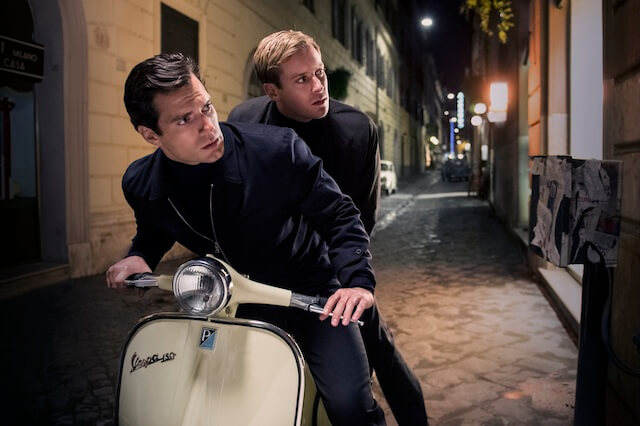‘The Man from U.N.C.L.E.’ No one in mainstream cinema does man-love like Guy Ritchie. The real entertainment factor in “Sherlock Holmes” was the bitchy repartee between Holmes and Watson, who bickered like a longtime couple. There’s a token female in “The Man from U.N.C.L.E.” — a slinky mechanic (Alicia Vikander) whose atomic scientist uncle has been kidnapped by dastardly forces. But the real passion is between its two spies: American Napoleon Solo (Henry Cavill) and Russian Ilya Kuryakin (Armie Hammer). When they first make eye contact during a nighttime car chase it’s love at first sight, and they proceed to snap at each other, using old-timey U.S.-Soviet relations to fuel their banter. It’s not gay panic, but it’s not platonic Hawksian comraderie either. It’s enjoyable precisely because they should clearly get a room already. What perhaps isn’t clear, at least to today’s moviegoers, is what “The Man from U.N.C.L.E.” is. The studio hasn’t bothered much to educate the kids on the ’60s show. Birthed in the wake of the initial ’60s Bond knockoffs and residing somewhere in between “The Avengers” (that is, the reliably witty, ostentatiously English show) and Dean Martin’s Matt Helm pictures. It distinguished itself in part with its relatively cool Cold War relations. Every week Napoleon and Ilya were forced to work together to thwart powers that threaten both their nations. Keeping nicely retro, and not remotely brooding, the new “U.N.C.L.E.” gives them the requisite origin story, finding them reluctantly teamed to thwart a nuclear holocaust threatened by a well-dressed, deadpan-quipping, albeit thoroughly forgettable mastermind (Elizabeth Debicki). RELATED: “Straight Outta Compton” gives N.W.A. their own Great Men biopic The actual plot, much less what’s going on in each bouncy set piece, doesn’t matter. For better and for worse, “U.N.C.L.E.” plays like a super-sized episode — inconsequential, an excuse for smirky fun and the occasional (though too occasional) old school gadget, bound to be repeated, with mild variations, over untold seasons. (“U.N.C.L.E.” lasted five, plus the occasional reunion.) Despite opening with Roberta Flack’s snappy version of the furious “Compared to What,” Ritchie’s film doesn’t take itself remotely seriously, content to be globe-trotting, summer brain-drain fun. It does have personality, if maybe not as much as the one that was planned, and sadly aborted, by Steven Soderbergh. Ritchie goes light on his look-at-me shots (cameras placed on closing car doors, a montage that mimics a photo carousel), but he does groove on Napoleon’s swinging cool, Ilya’s boiling temper and, again, heaps of winky gay innuendo. What’s more, he gives it his unmistakable asshole streak. Occasionally things get downright mean, as in a bit where Ilya gives chase to deadly henchmen while Napoleon chills in a truck, imbibing the contents of a picnic basket, presumably packed by an underpaid driver. We’re almost not supposed to like our leads, which is easy since, as a screen duo, Cavill and Hammer aren’t Tracy and Hepburn, or Robert Downey Jr. and Jude Law. Cavill does good dapper, but he’s more like a mannequin, and Hammer — who can do good arch elsewhere — fights to be known through a thick accent. Ritchie’s action scenes have visual and gag-heavy wit, and what would have otherwise been a joyless, explode-y assault on the villain’s lair becomes a jazzy riot of split-screens against noodly percussion. But even he trips up. One chase, featuring lots of Google Map-like zooming in and out on rugged terrain, is impossible to follow — enough of a thumb-twiddler for audiences to realize this is mildly subversive studio product, but studio product all the same. It gets patchier as it goes on, but by the time Hugh Grant, as the eventual head of the titular organization, belatedly swings by for good, tossing off politely undermining one-liners, it seems like perfectly passable entertainment in a time when the bar is set low. If only the next installment was out next week, rather than in three years — or, given the weak advertorial muscle behind it, perhaps never. Follow Matt Prigge on Twitter @mattprigge
Director: Guy Ritchie
Stars: Henry Cavill, Armie Hammer
Rating: PG-13
3 (out of 5) Globes
‘The Man from U.N.C.L.E.’ is like a TV episode and also enjoyably gay

Warner Bros. Pictures


















